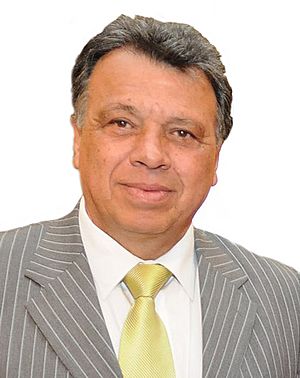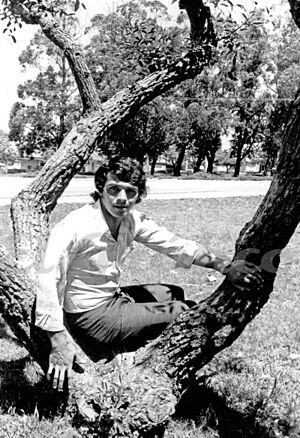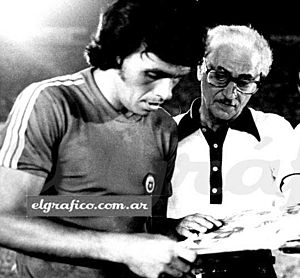Elías Figueroa facts for kids

Figueroa in 2011
|
||||||||||||||||||||||||||||||||||||||||||||||||||||
| Personal information | ||||||||||||||||||||||||||||||||||||||||||||||||||||
|---|---|---|---|---|---|---|---|---|---|---|---|---|---|---|---|---|---|---|---|---|---|---|---|---|---|---|---|---|---|---|---|---|---|---|---|---|---|---|---|---|---|---|---|---|---|---|---|---|---|---|---|---|
| Full name | Elías Ricardo Figueroa Brander | |||||||||||||||||||||||||||||||||||||||||||||||||||
| Date of birth | 25 October 1946 | |||||||||||||||||||||||||||||||||||||||||||||||||||
| Place of birth | Valparaíso, Chile | |||||||||||||||||||||||||||||||||||||||||||||||||||
| Height | 1.83 m (6 ft 0 in) | |||||||||||||||||||||||||||||||||||||||||||||||||||
| Position(s) | Sweeper, centre-back | |||||||||||||||||||||||||||||||||||||||||||||||||||
| Youth career | ||||||||||||||||||||||||||||||||||||||||||||||||||||
| Alto Florida | ||||||||||||||||||||||||||||||||||||||||||||||||||||
| Deportivo Liceo | ||||||||||||||||||||||||||||||||||||||||||||||||||||
| 1962–1964 | Santiago Wanderers | |||||||||||||||||||||||||||||||||||||||||||||||||||
| Senior career* | ||||||||||||||||||||||||||||||||||||||||||||||||||||
| Years | Team | Apps | (Gls) | |||||||||||||||||||||||||||||||||||||||||||||||||
| 1964–1966 | Santiago Wanderers | 54 | (0) | |||||||||||||||||||||||||||||||||||||||||||||||||
| 1964 | → Unión La Calera (loan) | 30 | (0) | |||||||||||||||||||||||||||||||||||||||||||||||||
| 1967–1972 | Peñarol | 51 | (0) | |||||||||||||||||||||||||||||||||||||||||||||||||
| 1972–1976 | Internacional | 145 | (8) | |||||||||||||||||||||||||||||||||||||||||||||||||
| 1977–1980 | Palestino | 118 | (6) | |||||||||||||||||||||||||||||||||||||||||||||||||
| 1981 | Fort Lauderdale Strikers | 22 | (0) | |||||||||||||||||||||||||||||||||||||||||||||||||
| 1981–1982 | Colo-Colo | 17 | (0) | |||||||||||||||||||||||||||||||||||||||||||||||||
| Total | 437 | (14) | ||||||||||||||||||||||||||||||||||||||||||||||||||
| International career | ||||||||||||||||||||||||||||||||||||||||||||||||||||
| 1966–1982 | Chile | 47 | (3) | |||||||||||||||||||||||||||||||||||||||||||||||||
| Managerial career | ||||||||||||||||||||||||||||||||||||||||||||||||||||
| 1993 | Santiago Wanderers | |||||||||||||||||||||||||||||||||||||||||||||||||||
| 1994-1995 | Palestino | |||||||||||||||||||||||||||||||||||||||||||||||||||
| 1996 | SC Internacional | |||||||||||||||||||||||||||||||||||||||||||||||||||
|
Medal record
|
||||||||||||||||||||||||||||||||||||||||||||||||||||
| *Club domestic league appearances and goals | ||||||||||||||||||||||||||||||||||||||||||||||||||||
Elías Ricardo Figueroa Brander (born October 25, 1946) is a former football player from Chile. Many people think he is the greatest Chilean footballer of all time. He is also considered one of the best defenders in the history of the sport.
Figueroa was known for his smart and elegant way of playing. He was a master at stopping opponent attacks and quickly starting a counterattack for his own team. He played for several famous clubs, including Santiago Wanderers in his home country, Peñarol in Uruguay, and Internacional in Brazil.
He also played for the Chilean national team 47 times. He was the team's captain and played in three FIFA World Cups: in 1966, 1974, and 1982. Because of his amazing skills, he was named South American Footballer of the Year three years in a row (1974, 1975, and 1976). In 2004, the legendary player Pelé named him one of the 125 greatest living football players.
Contents
Early Life and Start in Football
Elías Figueroa was born in the city of Valparaíso, Chile. He started playing football for local youth teams. In 1962, he joined the youth team of Santiago Wanderers, a major club from his hometown.
Just two years later, at age 16, he began his professional career with the Santiago Wanderers' main team. His talent was clear, and he was soon loaned to another team, Unión La Calera, to get more experience. By age 17, he was already playing for Chile's national youth team.
A Star in South America
Success with Peñarol in Uruguay
Figueroa's amazing performances got the attention of big clubs. In 1967, he moved to Uruguay to play for Peñarol, which was one of the best teams in the world at the time.
Even though he was young and playing with many star players, Figueroa stood out. He was named the best player in the Uruguayan league in 1967 and 1968. With Peñarol, he won the league championship in 1967 and 1968. He became a hero to the fans.
Glory with Internacional in Brazil
In 1972, Figueroa moved to Brazil to play for Internacional. This is where he became a true legend. He led the team to win the Brazilian national championship in 1975 and 1976.
He was the heart of the team's defense. Fans still remember his famous "Illuminated Goal" in the 1975 championship final. For four years in a row (1973-1976), he was named the best central defender in Brazil. He also won the award for the best player in the entire Brazilian league in 1972 and 1976.
His success was so great that he was named the South American Footballer of the Year for three straight years (1974, 1975, 1976). He beat out other famous players like Zico and Daniel Passarella for this award.
Later Career and Retirement
In 1977, Figueroa returned to Chile and joined the club Palestino. He led them to win the Chilean championship in 1978. He was also named the best player in Chile in both 1977 and 1978.
In 1981, he briefly played for the Fort Lauderdale Strikers in the United States. He then returned to Chile one last time to play for Colo-Colo. He retired from football in 1982 after a fantastic 20-year career.
International Career with Chile
Figueroa was the captain of the Chilean national team for many years. He led the team during one of its most successful periods, helping them qualify for three FIFA World Cups.
He played in the 1966 World Cup in England, the 1974 World Cup in Germany, and the 1982 World Cup in Spain. At the 1974 World Cup, he was named the best defender of the tournament. He also helped Chile finish second in the 1979 Copa América, a major South American tournament.
Figueroa's Famous Playing Style
Figueroa was nicknamed "Don Elías," which shows how much people respected him. He was a sweeper, a special type of defender who plays behind the main defensive line. He was brilliant at reading the game and knowing where the ball would go.
He was calm and never panicked. After stopping an attack, he could immediately start a new one with a smart pass. While other sweepers like Germany's Franz Beckenbauer often made long passes, Figueroa preferred short, quick passes to move the ball forward.
He was also strong, good at heading the ball, and a great leader. He was known for being a fair player and was only given a red card once in his entire career. One writer said Figueroa was "elegant, as an earl dressed in a suit, and dangerous as a Bengal Tiger."
Life After Football
After he stopped playing, Figueroa worked as a sports commentator on television in Chile and Brazil.
In 2011, a group called ChangeFIFA asked him to run for president of FIFA, the organization that governs world football. The group wanted him to help clean up the organization. Figueroa thought about it but decided not to run because he didn't have enough time to prepare.
Legacy and Honors
Elías Figueroa is remembered as a football icon. He won many awards during his career and is often included in lists of the greatest players of all time.
- South American Footballer of the Year: 1974, 1975, 1976
- FIFA 100: Named by Pelé as one of the 125 greatest living footballers.
- IFFHS Best South American Player of the Century: Ranked 8th.
- World Cup All-Star Team: Named best defender of the 1974 FIFA World Cup.
- Brazilian League Player of the Year (Bola de Ouro): 1972, 1976
- Walk of Fame: His footprints are preserved at the famous Maracanã Stadium in Brazil.
See also
 In Spanish: Elías Figueroa para niños
In Spanish: Elías Figueroa para niños
- Bola de Prata
- Bolo de Ouro
- South American Footballer of the Year
- FIFA 100
- List of celebrities who own wineries and vineyards
 | Stephanie Wilson |
 | Charles Bolden |
 | Ronald McNair |
 | Frederick D. Gregory |



